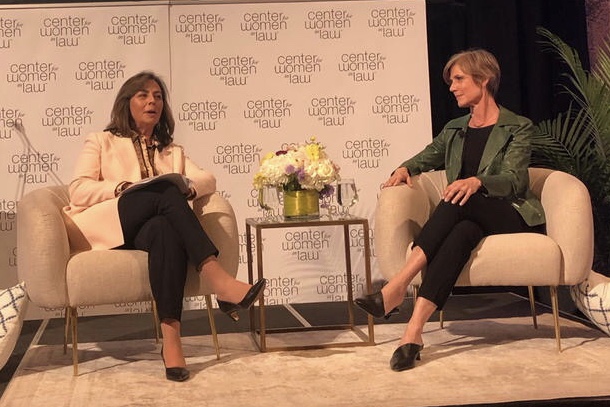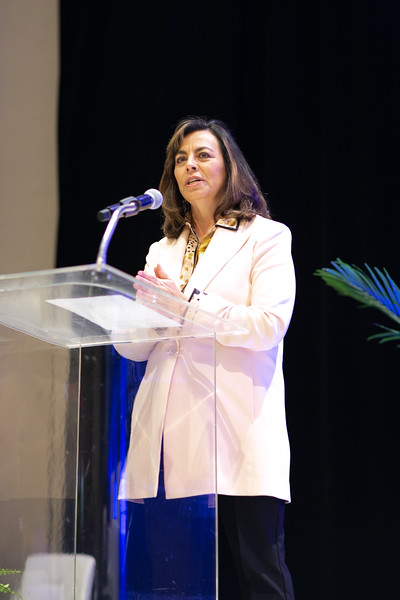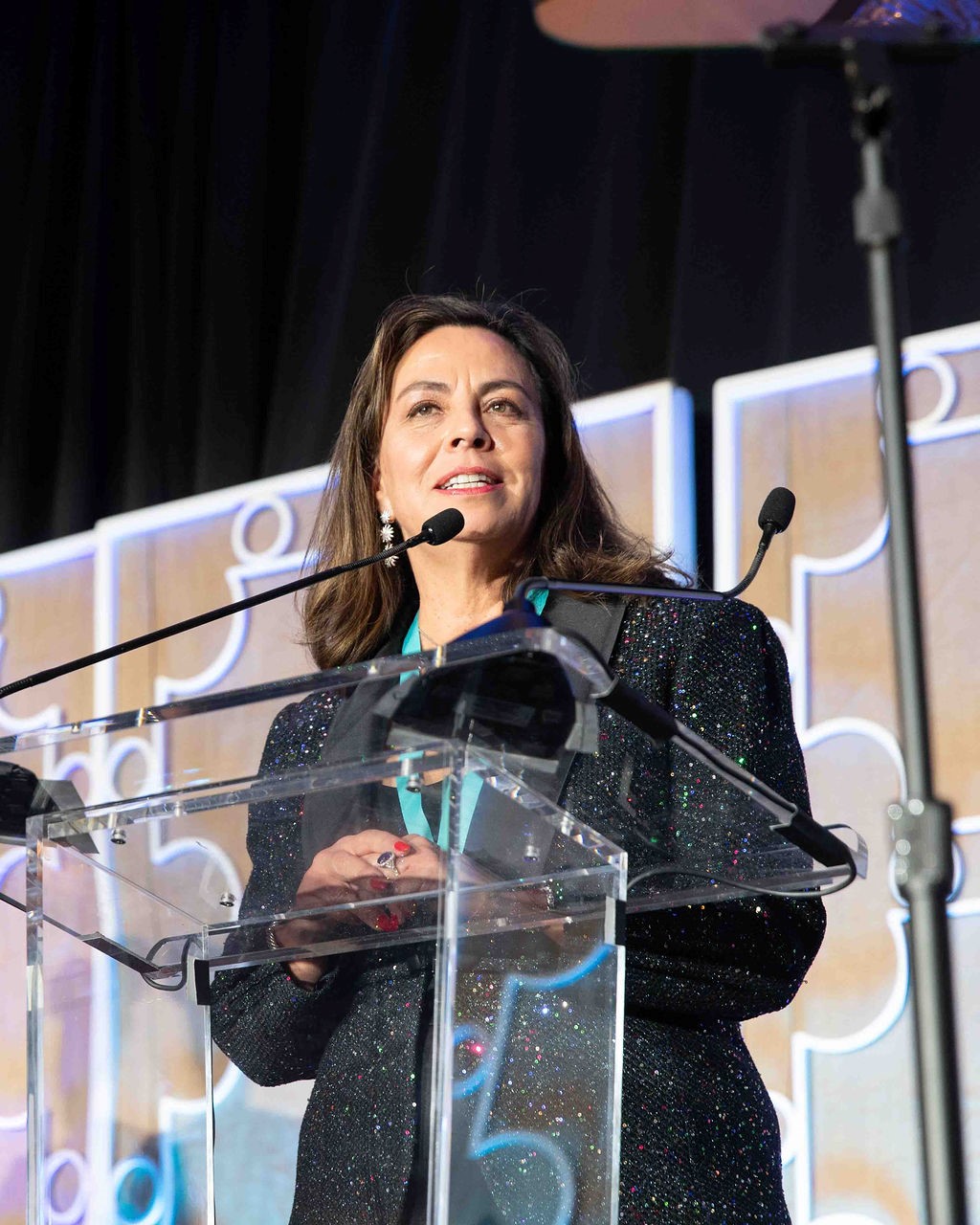Hilda Galvan was a young engineer working at Southwestern Bell in the technology industry in 1989 when an older colleague told her something that changed her life.
“The worst thing in life is to look back and say, ‘I wish I had,’” he told her.
Galvan convinced her husband to sell their newly built Dallas home while she moved to Austin for three years to attend law school while he worked as an engineer.
Thirty-five years later, Galvan is one of the most prominent and successful intellectual property litigators in the U.S. and is widely regarded as a leader in the legal profession and a role model for diversity and inclusion. She has won huge cases for IBM, Charles Schwab, OnStar, Motorola and Compass Bank. She has mentored scores of lawyers, including Lennox International Deputy General Counsel Monica Brown and Schwab Deputy Chief Counsel Jay Johnson.
“I have been so privileged to have such a wonderful legal career,” Galvan told The Texas Lawbook in an exclusive interview.
After nearly three decades at global legal giant Jones Day — including a decade as the managing partner of its Dallas office — Galvan has decided to step away to “seek new opportunities to make an impact.”

“My 28-year tenure at Jones Day not only qualifies me for retirement from the firm but also affords me the freedom to embrace new opportunities,” she said. “In this next phase, I plan to dedicate my efforts to consulting with technology startups, joining corporate boards and deepening my involvement in nonprofit boards and community engagement. This allows me to leverage my experience and passion in ways that will drive meaningful change.”
Brown, who has been announced as Lennox’s next chief legal officer starting March 1, said Galvan is “a change agent for careers.”
“When I was a young associate at Jones Day, Hilda took it upon herself to mentor and provide guidance,” Brown told The Lawbook. “She also sought me out to work on cases that provided experience that I was not able to get in other circumstances. She continues to mentor and provide guidance for those who have left the firm. Many have relayed stories of Hilda identifying and helping them to find new career opportunities.”
Deborah Sloan, a partner at Jones Day who also joined the firm in 1996, said Galvan is excellent at “recognizing talent and putting it to use.”
“For me, she was always the colleague who could relate the most to what I was seeking to accomplish as a lawyer with a family, intent on giving back to the community while also succeeding at a prestigious law firm,” Sloan said. “She was very generous with her insights and advice, which were priceless given her experience and her role in the firm and the legal community.”
“Hilda never loses sight of where she comes from and what is most important,” she said. “As one of the most successful women business leaders in Texas, she remains approachable and eager to help others succeed.”
Johnson, a former federal prosecutor who worked with Galvan for eight years at Jones Day before going in-house to Schwab in 2021, said Galvan’s leadership and legal skills get an “A-plus” rating.
“Hilda is the attorney version of the Kevin Bacon game,” Johnson said. “Because she is such a deep thinker and so highly regarded and well connected across the profession, to know Hilda is to never be more than one or two degrees from a thoughtful solution. That is true today, and it will be true tomorrow. Her rumored retirement won’t change anything.”
“Hilda set a tone and pace for the office that prioritized client need, championed diversity, rewarded creativity and left plenty of room for individual autonomy,” he said.
The middle child of three, Galvan was born in El Paso. Her mom was born in Mexico and dropped out of school in sixth grade. Her dad, who was born in Shafter, Texas, was the oldest son of a large Mexican American family. He quit high school as a sophomore to support the family. Despite their lack of schooling, both of her parents understood the value of an education and pushed their children “to do well in school and get a college education.” Her dad is now 92 and her mom is 85.

“My love of technology started in elementary school,” Galvan said. “In sixth grade, I attended a program where we learned to program on mainframes. Remember the deck of cards with one computer statement per card. That was how I started.”
The Texas Lawbook interviewed Galvan about her career, the challenges she faced as a Hispanic woman, how the legal profession has changed — for good and bad — during her 30-year career and the things she would do differently.
Texas Lawbook: Why retire now? And are you really retiring or just looking to do another kind of work?
Hilda Galvan: In April, I asked to step down as managing partner of the Dallas office, a role I held for nearly a decade. This decision stemmed from a desire to refocus on my personal goals and what I hoped to accomplish in the next phase of my journey. Over the following months, I concentrated on my ongoing patent litigation cases, while also evaluating whether I wanted to continue in that practice or seek new opportunities to make an impact. Ultimately, I opted for the latter.
Lawbook: What led you to patent litigation?
Galvan: My journey into patent litigation began somewhat unconventionally, shaped by both my background and my desire to carve my own path. With my engineering background, the natural expectation was for me to enter the field of patent law, either in litigation or prosecution. Because the idea of fitting into a predetermined mold has never appealed to me, I decided to start my legal career as an associate in the M&A practice at Gibson Dunn. I quickly realized that wasn’t the right fit. Ultimately, I pivoted to patent litigation, where I could leverage my technical experience and develop legal skills in a field that was growing and very challenging. In 1996, I moved to Jones Day to work with Robert W. Turner and Kenneth R. Adamo on the Texas Instruments worldwide patent litigation cases.
It was the best career decision I have ever made.
Lawbook: You have been extraordinarily successful as a lawyer and a law firm leader. What are the reasons behind your success?
Galvan: There are a number of reasons, but if I were to narrow it down to the top three, they would be:
- Common sense. In my career, I’ve observed that common sense is often the deciding factor between success and failure. Common sense to me is good judgment and strategic thinking. Despite their brilliance, many individuals fail to achieve their potential due to poor judgment or lack of strategic thinking. My focus on applying common sense in decision-making has consistently guided me through complex challenges and has been a cornerstone of my success.
- Heeding my dad’s advice. One guiding principle I’ve carried with me comes from my father: “Never let others define you.” This advice has empowered me to carve my own path and define success on my own terms, resisting any boxes others might try to put me in.
- Choosing the right life partner: Echoing the wise words of my mentor, Linda Addison, former U.S. managing partner at Norton Rose, “The most important career decision you will ever make has both everything and nothing to do with your job — and that decision is who you marry. If your career is not as important to your partner as it is to you, you don’t stand a chance.” Thankfully, my husband’s unwavering support has been a pivotal element of my ability to succeed in demanding roles.
Lawbook: How has the world of business law changed for women during your three decades? Has it changed enough?
Galvan: Over the past three decades, there have been significant strides in the number of opportunities available to women in the world of business law. Women now have greater access to top law schools, positions within prestigious law firms, roles in the judiciary and spots in corporate legal departments. This increase in opportunities has led to a rise in the number of women ascending to roles such as partners, judges and general counsels, and achieving higher ranks within law firms and corporations.
Despite these advances, the metrics for evaluating performance have not progressed equally. Women lawyers are often assessed based on their proven accomplishments rather than their potential, a standard that is frequently applied differently to their male colleagues. Additionally, when women achieve results comparable to those of men, the recognition they receive can be less enthusiastic, sometimes perceived as merely satisfactory rather than outstanding.
Lawbook: How has the world of Big Law changed during your 30 years — for the good and the bad?

Galvan: Over the past 30 years, technology has significantly changed how we work in Big Law, greatly enhancing work-life integration. When I started as a young associate, everything had to be done in the office due to technological limitations. For example, in litigation, filing a brief involved several in-office steps: a partner would review the brief, call me into their office for markup discussions, and then the document needed to be typed, printed, reviewed again, revised, copied and couriered to the courthouse. Today, all these steps can be handled electronically from the comfort of one’s home, offering much greater flexibility.
However, this technological progress comes with drawbacks, particularly for the training and development of junior attorneys. Technology now automates many tasks that junior attorneys once performed, reducing crucial hands-on training opportunities. These tasks were instrumental in their professional development. Additionally, as the billing rate gap between junior and senior attorneys has narrowed, it is no longer economically efficient for firms to assign simpler tasks to less experienced attorneys, further reducing their hands-on training opportunities.
Lawbook: What do you consider your three or four biggest successes during your career?
Galvan: Answering what my biggest successes are is always challenging because success isn’t solely about individual achievements — it takes a village. For me, the most significant successes have come from reaching three specific goals that I set for myself, each of which required collaboration with and support from others.
One of my earliest goals was to become a first chair trial lawyer in patent litigation, a field where, at the time, very few women were present. My breakthrough came from a France-based client who entrusted me with this pivotal role, providing me the platform I needed to build my reputation. Success in that first trial, and the ones that followed, wasn’t just my own but a testament to the incredible team at Jones Day — both lawyers and staff — who worked tirelessly alongside me.
Another significant goal was set during my tenure as the managing partner of Jones Day’s Dallas office: to enhance the firm’s visibility and reputation within the local community. Early on, it was disheartening to meet business and legal professionals unaware that Jones Day had been a part of the Dallas community since 1981. Inspired by the community engagement models of respected Texas law firms, I decided we needed to deepen our involvement with local organizations, and we did — from the Dallas Regional Chamber to United Way, and from educational institutions like SMU and Cristo Rey Dallas to cultural institutions like the Dallas Theater Center. This initiative was not just about doing good; it was about showcasing the exceptional individuals at Jones Day and forging meaningful community ties.
My third goal, and in many ways the most important one, was to always treat others with respect. Throughout a career filled with incredible experiences and successes, I’ve seen how easy it can be for professionals to treat only certain people with respect based on their position or status. I never wanted to be that person, and I believe I have succeeded. The best compliment I ever received was a few years ago during an elevator ride with one of our staff members who had been with Jones Day for over 20 years. He turned to me and said, “Hilda, you are the same person now that you were when you first walked into Jones Day. Thank you for that.” That moment affirmed for me that I had successfully accomplished this goal.
Lawbook: Similarly, what were your biggest challenges?
Galvan: There have been two particularly challenging phases in my career: my first year as a lawyer and my first year as a partner. Each presented unique challenges, but both taught me resilience and adaptability.
My first year as a lawyer was also my first year as a mother. Balancing the demands of a newborn and the rigorous expectations of Big Law when my husband was my sole family support in Dallas was overwhelming. The days were a blur, with late nights at the office followed by sleepless nights at home. It was a year of testing my endurance and commitment, resulting in intense personal and professional growth.
I faced a different kind of challenge when I made partner. As a senior associate, I was always in demand and received the prime assignments. Suddenly, as a new partner, I found myself without first-chair experience, needing to step out from the shadow of the partners I had worked alongside without damaging those relationships. It was a year of forging a new path, establishing my own reputation and approach within the firm.
Lawbook: Anything you would do differently?
Galvan: After pivoting from M&A to patent litigation, I set two primary goals for myself: to become the best patent litigator possible and to make partner at Jones Day. Once I started down this path, I became so focused that I never paused to reassess those goals or consider other opportunities. Looking back, this is what I would do differently — I would take the time to pause and reflect on my progress and potential future paths. I finally did that recently when I decided to retire from Jones Day and dedicate my efforts to consulting with technology startups, joining corporate boards and deepening my involvement in nonprofit boards and community engagement.
